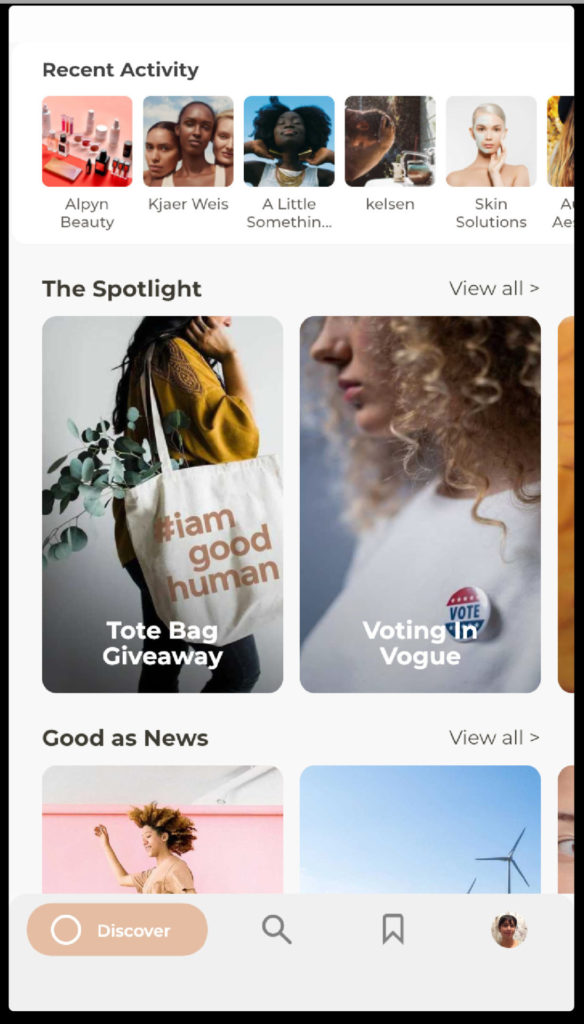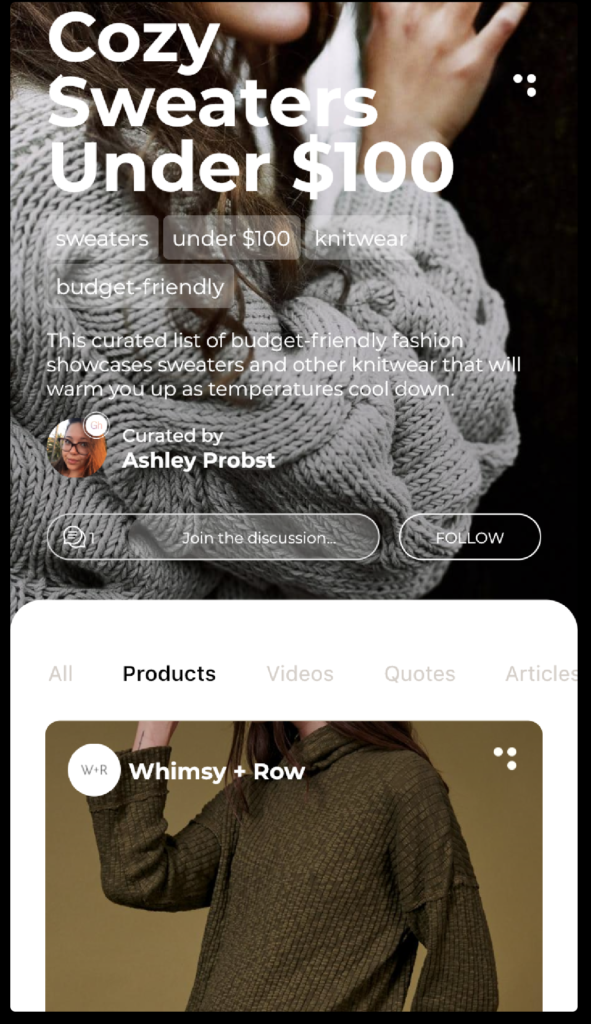You roll out of your sustainable bamboo bedsheets, shower with non-toxic soap and shampoo bars, slip on your recycmachinled cotton bathrobe, and brew up some organic fair-trade coffee. Perhaps you've avoided a certain online megamall (that one named after the world's largest rainforest) to procure those items, or you're seeking a like-minded alternative that fits with your conscious living routine.
Whatever the case, you'll want to download GoodHuman, a new Los Angeles-based shopping and content app for iOS (and coming soon for Android) that aims to be the "Amazon for good," says L.A.-based CEO James Glasscock.
The goal is to help people — namely, values-minded millennials and Gen-Z — discover new and established ethical direct-to-consumer brands and retailers that "stand for something," Glasscock tells UncoverLA. He co-founded the company with CTO/CPO Thomas Hale; together, they head a team of less than 10 people to curate 50,000 products from 650 digital-native brands and boutiques.
GoodHuman features a Pinterest-style "StreamBoard" format focused on categories including clean beauty, sustainable fashion, non-toxic home goods, and more, plus original stories and community-curated content such as articles and videos.
One StreamBoard features under-$50 tees from Amour Vert, L.A.-based Groceries Apparel, Known Supply, Kotn, and other eco-conscious labels alongside a Vogue Business story on sustainable style. You'll find sustainable activewear from Girlfriend Collective, ioMerino, Outdoor Voices, Thread 4 Thought, and more brands — then swipe to see workout videos or articles from New York Times or GQ about mid-pandemic exercising. Currently, there are about 50,000 products on the app.
You can also shop for skincare from Malibu-based Osea and True Botanicals, cosmetics by Kjaer Weis and L.A.'s own Noto Botanics, microbiome-friendly cleaning products by Counter Culture, biodegradable soaps by Common Good, home textiles by Able, bedding by Bhumi, furniture by locally-based Medley.
Also on offer are L.A.-based names including Asystem, Back Beat Co., Christy Dawn, Doen, Ettitude, Ética Denim, Industry of All Nations, the Little Market, and Noto Botanics alongside labels and retailers like Allbirds, DL1961, Fair Indigo, Indie Lee, Kowtow, Lucy and Yak, United By Blue, and many, many others.
"Beginning in the late 2010s, we saw thousands of new direct-to-consumer brands that are natively ethical from the ground up," Glasscock tells UncoverLA. "They had already had done their soul-searching on clean ingredients and sustainable packaging, and how to produce with a [low] carbon footprint."
Those ethical native brands are growing 50% to 500% faster than those not marketed sustainable, says Glasscock, who points to a recent study by NYU's Stern School of Business. Many of those startups see Seattle-based Amazon as a "competitive threat."
The Jeff Bezos-helmed company recently admitted to using "aggregated data" from third-party sellers in determining products for its in-house labels. Its minimalist footwear was quickly called out for being a non-sustainable dupe of eco-friendly brand Allbirds' popular merino wool kicks. The online giant apparently isn't great for big brands either: Luxury company Overland, known for its sheepskin outerwear and accessories, recently broke up with Amazon.
GoodHuman aims to make it easier for conscious D2C brands to do business by giving them control over their customer relationships. That means that when shoppers buy a product, they're "clicking through to those brands' websites," says Glasscock. "Next year we'll introduce a universal cart. You'll be able to buy from multiple brands, similar to how [e-comm sites like] Etsy and Farfetch work."
"Our mission isn't to make everyone be sustainable and ethical; [that] starts to sound like preaching a religion," says Glasscock. "We want to make it convenient to be a good human. Not everyone [can afford to] jump on the sustainable and ethical 'religion'; [it's about offering] easier solutions."
Creating an ethical one-stop shop "is certainly not an original idea," he says, but he and his co-founder have the right combination of tech, startup, and venture capital experience and passion to build it. Glasscock comes from the post-dotcom era of digital media and headed business planning and development for companies like Turner, Playboy, and Warner Bros., to name a few. Hale's entrepreneurial spirit saw him co-found several music tech companies; most recently, he led Pluto TV's programming and content strategy.
"Humans love convenience, but all of these conveniences have these hidden costs [and] trade-offs," he continues. Two-hour delivery is now one-hour, and the speedy shipping (not to mention excess packaging) comes at the cost of workers and the environment.
"People are overwhelmed [by the options in the marketplace]. We are all good humans, but we just need to make it a little easier for everybody," says Glasscock.
We recently sat down with Glasscock to learn more about GoodHuman's mission, what it was like to launch a new business during a pandemic, and more. Read on below, then download the free app here.
What were some of the initial conversations that led to GoodHuman?
We thought, 'Why are there so many great and ethical direct-to-consumer ethical brands, [and no way to shop them in one place]?' That would make a lot of lives easier. The other piece of this is we have a large generation of millennials and Gen Z who are prioritizing brands that stand with something. Older generations, not so much; they're from a different era, a different set of values.
And when you look at the [McKinsey] survey data or [Stern School's report with IRI], you see that it's growing very fast — Anywhere from 50 to 500% compared to their non-sustaintainble counterparts.
The third piece [is based on the] big report from the United Nations on how fast we need to take significant action to avoid [severe effects of global warming]… It's happening, and we need to do all we can because the impacts of climate change are going to be much bigger. This [current] pandemic has made all of our lives turned upside down, but climate change is a much bigger threat in my opinion.
Those were the conditions we were noticing, and we were wondering why this hadn't been done.
Launching a product in these — for lack of a better term, "unprecedented" times, doesn't sound easy. What has that been like?
Honestly, we're lucky. A lot of people are dealing with a lot of challenges, and we've been able to keep our heads down. A lot of people pushed us not to launch right now.
You and your co-founder, Thomas Hale, have extensive experience in the online media world as well as business and product development. How did that play a role in GoodHuman?
I have an incredible co-founder who was the head of product experience at Pluto TV [which] was sold at Viacom at the beginning of 2019. He is a designer and technology leader, and together, we took the lessons learned from my time at Machina…and all of our media experiences.
[We were focused on] the idea of integrity, and what does integrity mean. We had some unpleasant experiences in past roles, so we wanted to build a culture around integrity — not just us as founders and employers, but also a community.What was the beta testing process like, and what feedback did you get?
We have a waitlist of about 6,000 people, and we got about 1,000 people testing. What we learned along the way [across] several iterations is that there are really three groups of people. One group won't use the app very often. Another group that will use every day, and they're primarily interested in social media tools related to sustainability and ethics. They'll follow other users and communicate and collaborate directly with them.
Then there's a group in the middle who will use it three times a week or a few times in the month. [The last two groups] really want the "Amazon for good" piece; they're the most important groups that we're focused on.
What's coming down the pipeline for GoodHuman?
Pretty soon we're going to do the GoodHuman digital series, both live and on-demand. It will be a campfire-style conversational experience, and we're bringing in sustainability leaders and planet activists [to name a few].









